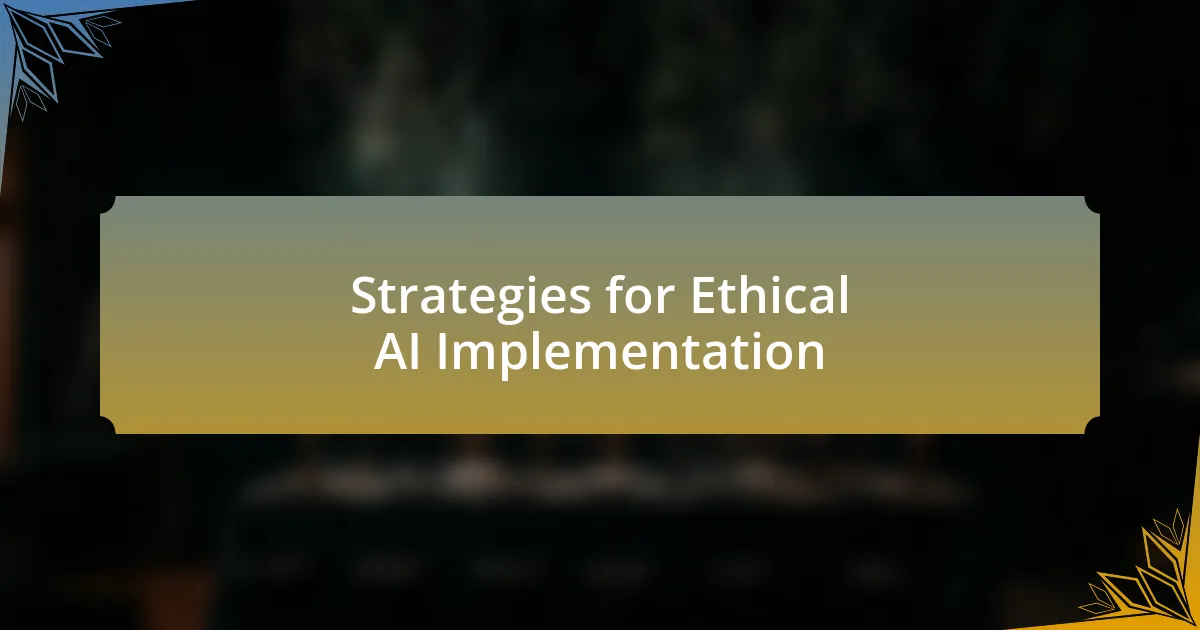Key takeaways:
- The ethical responsibility of stakeholders is critical, emphasizing the need for transparency and customer trust in AI interactions.
- AI can perpetuate bias and affect fairness; strong accountability measures are essential to ensure responsible decision-making.
- Engaging customers in AI discussions fosters trust and enhances the overall experience by addressing their concerns about data privacy.
- Continuous learning and open dialogue about AI ethics within teams can mitigate risks and promote better ethical practices in AI implementation.

Understanding AI Ethics
When diving into the realm of AI ethics, I often reflect on the balance between innovation and responsibility. It’s fascinating how technology can drive efficiency but also raise profound questions about privacy and bias. I’ve personally experienced moments where the use of AI in customer interactions felt intrusive rather than helpful, making me ponder the fine line between enhanced service and overreach.
One aspect that truly resonates with me is the ethical responsibility we have as stakeholders. I still recall a project where we integrated AI to analyze customer feedback. While it provided valuable insights, it was alarming to realize how easily we could misinterpret data trends if we weren’t vigilant. How can we ensure that AI serves our customers without compromising their trust?
Moreover, I find it crucial to address the question of transparency. Can customers genuinely feel secure knowing that an algorithm is making decisions about their preferences? From my experience, I’ve seen the impact of being open about AI’s role in customer experiences. When companies communicate how AI tools work, it can foster a sense of trust that ultimately enhances the overall customer experience. It’s this kind of proactive approach that makes a significant difference.

Importance of AI Ethics
When discussing the importance of AI ethics, I often think about the implications for fairness in customer treatment. I remember a time when our AI system recommended products based on past purchases without considering the customer’s evolving preferences. It highlighted for me how easily AI can perpetuate biases if we don’t actively question its recommendations. Shouldn’t we strive for an AI that reflects the diversity of our customer base rather than reinforcing stereotypes?
Another critical component of AI ethics is accountability. I once participated in a customer feedback initiative where we realized that the AI’s suggestions weren’t just guiding decisions but affecting our team’s confidence in performing their roles. The reliance on AI sometimes created a layer of detachment from our customers, making me wonder: who is responsible when a poor decision leads to a negative customer experience? I believe it’s essential for businesses to establish clear accountability frameworks to navigate this terrain responsibly.
Finally, I’ve come to appreciate how essential it is to involve customers in conversations about AI. In one of our workshops, we invited customers to share their thoughts about AI-driven services. Their insights were eye-opening; they emphasized the need for consent and control over their data. This made me realize that ethical AI isn’t just about adherence to guidelines but also about forging genuine connections. Don’t you think that when organizations listen to their customers, they not only bolster trust but also enhance the overall experience?

AI Ethics in Customer Experience
AI has a profound role in shaping customer experiences, but it’s crucial to examine the ethical ramifications. I recall a project where our AI tool inadvertently prioritized efficiency over empathy in customer interactions. This led to situations where customers felt undervalued because their unique concerns were lost in the process. Shouldn’t our technology enhance human connection rather than diminish it?
Moreover, the transparency of AI algorithms is a vital ethical concern. I once found myself frustrated when trying to understand why a particular AI-driven recommendation was made for a customer. It left me pondering: if I, as a customer experience professional, struggle to grasp these decisions, how can our customers feel secure in trusting AI? I believe fostering transparency not only builds trust but also empowers customers to engage with AI solutions meaningfully.
Lastly, protecting customer data in the age of AI is more than just a technical requirement; it’s an ethical obligation. During a discussion with peers about AI ethics, one made a poignant remark about how customers often feel treated like data points rather than individuals. This vivid realization struck me—how can we ensure that our systems respect privacy while delivering personalized experiences? By putting data ethics at the forefront, we create a customer-centric approach that respects personal boundaries and nurtures loyalty.

Key Challenges in AI Ethics
One of the significant challenges I’ve encountered in AI ethics revolves around bias in algorithms. There was a project where we noticed our AI system was unintentionally favoring a specific demographic. It was alarming to see how deeply ingrained biases could shape customer interactions, leading to inequality. How do we rectify this without compromising efficiency? It requires meticulous training and constant auditing to ensure that AI systems serve all customers fairly, which is no small feat.
Another challenge is the issue of accountability. I often ask myself, who is responsible when an AI system makes a mistake? In a situation where a customer was wrongly informed due to an AI error, I felt a profound sense of responsibility as a CX professional. It was a stark reminder that while AI can automate tasks, the human element is irreplaceable when it comes to accountability. Transparency in decision-making processes is vital, but we must also prepare ourselves to own up to the flaws that inevitably arise.
Lastly, the evolving landscape of regulations around AI adds another layer of complexity. I experienced this firsthand during a recent discussion with colleagues about upcoming legislation around AI usage. The uncertainty leaves many of us asking: how can we innovate responsibly while keeping pace with regulatory changes? Balancing innovation with compliance is tricky, but recognizing the ethical implications of our technology is critical for sustainable customer relationships.

Strategies for Ethical AI Implementation
A critical strategy I’ve adopted for ethical AI implementation is ensuring diverse data representation. During a project last year, I pushed for including datasets that reflected a wider spectrum of customer backgrounds. It’s crucial to ask ourselves, how can we build trust if our data only speaks for a narrow slice of society? By actively seeking diverse perspectives, we not only reduce bias but also enhance the relevance of AI insights in serving all customers.
In my experience, fostering a culture of continuous learning about AI ethics within the team has been invaluable. I recall hosting a workshop where we discussed real-life scenarios of AI failures. It was enlightening to see how open dialogue encouraged my colleagues to confront uncomfortable truths about our systems. How can we protect our customers if we’re not willing to learn from our missteps? By promoting regular training and discussions, we empower our teams to recognize and address ethical challenges proactively.
Moreover, transparency has proven to be a game changer. I remember when we faced backlash from customers who felt our AI recommendations were too opaque. We took a step back and created an easy-to-understand explanation of how our algorithms worked. It reinforced my belief that if customers understand the “why” behind AI decisions, they’re more likely to trust the implementation. So, how do we ensure transparency? By being candid about our processes and inviting feedback, we create a collaborative atmosphere that prioritizes ethical considerations.

Personal Experience in AI Ethics
When I think back to my initial encounters with AI ethics, I remember a pivotal moment during a project meeting. A team member questioned the ethical implications of our AI-driven customer segmentation. That question struck a chord with me; it was a wake-up call that taught me the importance of integrating ethical considerations into every layer of our strategy. It made me reflect: how often do we overlook ethical dilemmas in the pursuit of innovation?
During a customer feedback session, I experienced firsthand the impact of our ethical choices—or lack thereof. A customer candidly expressed her frustration with how our AI system misidentified her preferences, leading to frustratingly irrelevant recommendations. This moment opened my eyes to the human side of AI—beyond the algorithms and data lies the real experience of our customers. It made me realize that ethics in AI isn’t just about compliance; it’s about respecting and valuing our customers’ individuality.
I once took part in a brainstorming session focused on an AI tool designed to automate customer support interactions. As we discussed its implementation, the room buzzed with excitement, but I couldn’t shake the feeling that we were rushing ahead. I asked, “What happens if it violates our customers’ privacy?” The silence that followed was telling. It was a reminder that ethical reflections shouldn’t be an afterthought but rather an integral part of our conversations. This experience deepened my resolve to advocate for ethics in AI—a focus that ultimately cultivates trust.

Lessons Learned from AI Ethics
I learned that ethical considerations in AI can significantly influence customer trust and loyalty. During a case study review, I encountered a situation where a well-intentioned algorithm inadvertently marginalized a segment of our customer base. It was shocking to see how quickly a seemingly innocuous decision could alienate users. It made me question: How deeply do we understand the implications of our AI models on every demographic?
One memorable lesson came during a collaborative workshop where we evaluated our AI’s decision-making process. A colleague shared how biased training data led to skewed results, ultimately sacrificing fairness for efficiency. I couldn’t help but feel a weight on my conscience—were we prioritizing expediency over ethical integrity? This moment underscored the reality that we must continually audit our AI systems, not just to meet compliance standards but to genuinely serve all of our customers.
Reflecting on my experiences, I see that open dialogues about AI ethics need to become standard practice in teams. I remember a time when we hesitated to confront difficult conversations about algorithmic transparency because it felt uncomfortable. Yet that discomfort is crucial; embracing it has fostered a culture where ethical dilemmas are seen as opportunities for growth and understanding. It reinforced my belief that navigating AI ethics is not a hurdle but an essential journey toward better customer experiences.